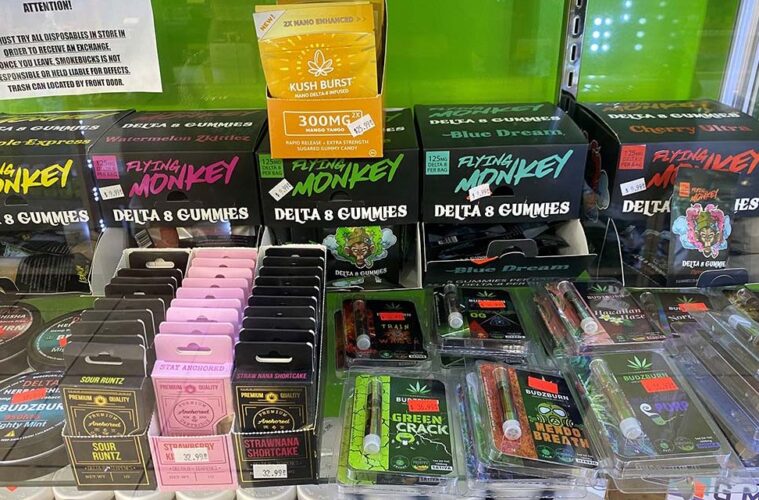Hemp businesses have not had it easy. Between a lack of regulations and supply chain infrastructure, and plummeting wholesale pricing, most hemp companies have had to pivot to break even. Making delta-8-THC, a compound derived from hemp, was the shift many business owners decided to make. In a new white paper report by cannabis analytics firm Brightfield Group, hemp companies have cumulatively sold more than $2 billion worth of delta-8-THC products since 2020, according to Forbes.
The delta-8-THC boom occurred after hemp was legalized in the 2018 Farm Bill. But unlike naturally occurring delta-9-THC, delta-8 is made through a chemical process that converts federally legal CBD into a psychoactive form of THC. There are dozens of other hemp-derived psychoactive cannabinoids on the market right now due to hemp legalization and federal marijuana prohibition, including HHC, THC-O, and THC-P, but as the new report indicates, delta-8 THC is the most popular of the bunch.
These alt-cannabinoids have become so popular that many states have banned them. But prohibition doesn’t work — we know this. And the verbiage in the Farm Bill doesn’t make delta-8 illegal. The DEA and the US Court of Appeals have confirmed that the specific wording of the 2018 Farm Bill makes all psychoactive hemp products federally legal, as long as they don’t contain significant amounts of natural delta-9-THC. So, there’s that.
But as we stated earlier, the feds haven’t released hemp regulations. This creates an issue around product quality and safety testing because companies are not required to do so. Researchers have already discovered that many popular delta-8 products contain dangerous levels of heavy metals and other toxic contaminants. Another recent study has suggested that THC-O, another novel hemp cannabinoid, could potentially cause serious lung damage when vaped.
The Brightfield Group report notes that 35% of CBD users have purchased psychoactive hemp-derived products within the past six months. Surprisingly, some of this interest comes from states where weed is already legal. About a quarter of legal cannabis users told Brightfield that they are also interested in checking out delta-8 products.
Unsurprisingly, the greatest proportion of delta-8 sales comes from states where weed remains illegal. Delta-8 tinctures, vapes, and gummies are readily available online, at local hemp stores, and even at gas stations nationwide. And while most states have banned sales of these products, they haven’t criminalized their possession or use. As a result, weed lovers in prohibition states can freely access various psychoactive THC products without the risk of being jailed.
The report suggests that delta-8-THC’s popularity is increasing at such a rapid rate that it may end up posing a threat to state-legal cannabis industries. Hemp products are generally less expensive than legal weed products because they’re not subject to excessive taxes, testing, and other compliance costs. The cheaper prices cause many price-conscious consumers to choose unregulated hemp cannabinoids over expensive legal weed.
It’s easy to see why someone who lives in a prohibition state would choose to consume hemp/delta-8-THC products. It’s the only plant-based herb around to get high from. This access, however, could potentially discourage cannabis lovers from advocating or voting for full-legalization campaigns, the report suggests. To combat this potential market share loss, Brightfield urges legal cannabis companies to highlight how their quality-controlled products are safer than the unregulated competition. The report suggests that legal weed companies could also consider launching their own lines of hemp-derived products.
“Cannabis companies should consider if they want to invest in launching hemp-derived Cannabinoids in non-legal THC markets to get regional brand exposure before full legalization occurs,” Brightfield suggests, according to Forbes. “Although this could cause confusion later, it is a way to seed the brand while regulatory and legal issues settle.”
However, the 2023 Farm Bill is just around the corner, and it is likely that Congress will choose to ban delta-8 and all other psychoactive THC alternatives.


